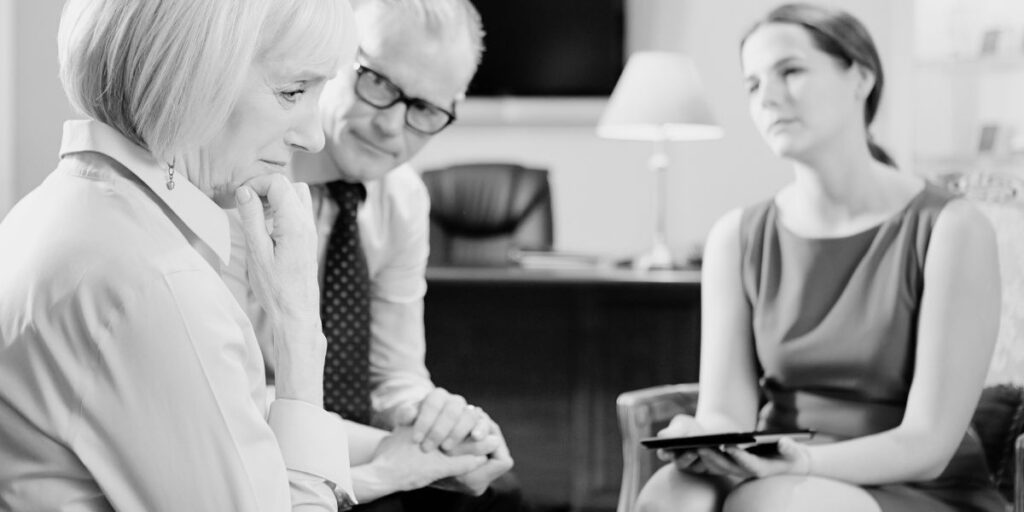
What Most People Don’t Realize
What happens without a will? It doesn’t just create paperwork. It creates confusion, conflict, and unintended outcomes that can leave loved ones feeling powerless. Even when the estate seems “simple” on paper—a shared home, some retirement savings, and a life insurance policy—state laws take over. And those laws don’t know your family dynamics, your wishes, or your values.
This is one of the reasons I do what I do. I’ve lived through this myself—and I’ve seen far too many families fracture when a little bit of planning could have prevented the drama. The names in these stories are fictional, but the scenarios and emotions? 100% real.
To keep things consistent across the following scenarios, we’re assuming:
- A co-owned home (not in a trust)
- Both spouses have a 401(k) with no named beneficiary
- Both spouses have a life insurance policy with a named beneficiary
- Two children, where applicable
- No will or trust in place
Let’s take a look at what really happens when there’s no plan…
Scenario 1: Second Marriage, Adult Kids from Both Sides
Profile: Marcus (68) and Lisa (66)
Marcus and Lisa had been married for 25 years. Lisa had two adult daughters (both in their early 40s) from a previous marriage. Together, she and Marcus adopted a son, Jacob, age 26.
🎥 Watch this real-life story
Without a Will
- Lisa died first, without a will. Her life insurance went to Marcus, and her 401(k) was distributed to him through probate, since no beneficiary was named. Her share of their home and other assets also passed to him under state intestacy laws.
- When Marcus died, his 401(k), the house, and Lisa’s remaining estate all passed to Jacob, their adopted son—because he was Marcus’s only legally recognized heir.
- Lisa’s daughters were completely excluded. Though they had spent part of their teenage years in the home and remained close with their mother and stepfather, they had no legal claim to Marcus’s estate, they had no legal claim to Marcus’s estate.
- The outcome left deep emotional scars, a broken sibling relationship, and a lot of legal fees.
With a Will
- Lisa could have ensured her daughters were included in the estate.
- Marcus could have divided his estate among all three children.
- Instead of a family unraveling, there could have been healing and clarity.
Why Order Matters
If Marcus had died first, Lisa would have inherited everything. Then, when she passed, her estate would have been divided equally among her three children (two biological, one adopted). But because Lisa died first and Marcus had no plan, only Jacob inherited.
|
Asset |
Without a Will |
With a Will |
|
Home |
Passed to Marcus; then to Jacob |
Divided among all 3 children |
|
401(k)s |
Lisa’s passed to Marcus; Marcus’s passed to Jacob |
Split among all 3 children |
|
Life Insurance |
Lisa to Marcus; Marcus to Jacob |
Could be redistributed or offset by other gifts |
Scenario 2: Young Married Couple, No Kids
Profile: Jenna (34) and Chris (36)
Jenna died suddenly in a car accident. The couple owned their home jointly. Jenna had a 401(k) with no named beneficiary and a small life insurance policy naming Chris. Her parents are still living.
Without a Will
- The home stayed with Chris, but probate required Jenna’s parents to be notified.
- Jenna’s 401(k) went to probate and was frozen for 9 months. Her parents and Chris had to submit documentation.
- Her mother believed she should inherit a portion, creating tension with Chris.
With a Will
- Jenna could’ve stated clearly that Chris should receive her assets.
- Her parents could’ve been spared the uncertainty—and Chris the emotional toll.
|
Asset |
Without a Will |
With a Will |
|
Home |
Chris (co-owned) |
Same |
|
401(k)s |
Frozen; distributed via probate to spouse/parents |
Goes directly to Chris |
|
Life Insurance |
Goes to Chris |
Same |
Scenario 3: Unmarried Couple with Kids
Profile: Dani (42) and Leah (40)
Dani and Leah were unmarried partners who had been together for 12 years, raising two kids (ages 6 and 9). Dani was the primary earner. She died unexpectedly. The life insurance named the kids, and the 401(k) had no listed beneficiary.
Without a Will
- Leah wasn’t legally recognized. She had to petition the court for access.
- A judge appointed Dani’s estranged father—whom she hadn’t spoken to in over a decade—as executor, guardian, and manager of the children’s inheritance.
- Because Dani and Leah weren’t legally married, her father also made a claim for Dani’s 50% of their co-owned home. Leah was forced to either buy him out or sell the home entirely.
- Leah had to fight for guardianship and financial access while grieving.
With a Will
- Dani could have named Leah as both guardian and manager of the estate.
- The family could have avoided legal red tape and stayed stable during grief.
|
Asset |
Without a Will |
With a Will |
|
Home |
Dani’s 50% claimed by her father; Leah must buy out or sell |
Full home protected for Leah and kids |
|
401(k)s |
Goes to kids via court |
Managed by Leah for the kids |
|
Life Insurance |
To kids in custodial accounts |
To kids with Leah as trustee |
Scenario 4: Divorced Parent with Kids from Previous Marriage
Profile: Amanda (51)
Amanda was divorced with two teenage children. She owned her home and had a modest 401(k) and life insurance policy naming her kids. She passed away from a stroke with no will in place.
Without a Will
- Her ex-husband became the default guardian of the kids and their money.
- Her sister, who had helped raise the kids, had no say in anything.
- The estate went through probate, creating more delays and confusion.
With a Will
- Amanda could have named her sister as guardian and financial manager.
- She could’ve ensured the kids’ money was protected—and not handled by her ex.
|
Asset |
Without a Will |
With a Will |
|
Home |
Goes to kids; managed by ex |
Held in trust, managed by sister |
|
401(k)s |
To kids; ex controls |
Held in trust, managed by sister |
|
Life Insurance |
To kids |
To kids, with chosen trustee |
Why This Matters
Now that you’ve seen what happens without a will, I hope you see that estate planning isn’t just legalese—it’s love in action. It’s not about assets. It’s about clarity, compassion, and protecting your people from unnecessary pain and confusion.
You don’t have to figure it all out today. But please, don’t wait for “someday.”
🔗 Ready to protect your people, not just your property?Explore our Legacy Planning Services or book a free discovery call with me today.
Disclaimer: These scenarios are illustrative and based on Texas intestacy laws as outlined by Texas Law Help. I am not a lawyer and this article is not legal advice. For personalized legal guidance, please consult a qualified attorney.



